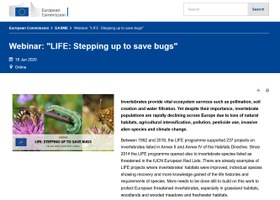LIFE webinar summary "Stepping up to save bugs"
On June 18th 2020, the webinar "Stepping up to save bugs" organised by EASME was held to inform on the issues of conservation of invertebrates and EU policies to safeguard biodiversity, and to incentive the development and submission of LIFE projects targeting invertebrates.
The new EU policies of reference – the Biodiversity Strategy and the New Green Deal – intend to provide an answer to two increasingly pressing needs: the contrast to climate change and to biodiversity loss.
The Biodiversity Strategy can be considered the most ambitious strategy with regards to conservational issues so far, as it sets the development of a coherent network of efficiently managed and monitored protected areas (for a total coverage of up to the 30%). One of the specific objectives of the strategy is the reversal of the pollinators’ loss trend.
A first necessary step to boost conservation interventions in favour of invertebrates consists in the development of synergies between different stakeholders, covering the gap between research and practitioners, and integrating the topic of conservation in the field of agriculture.
An efficient conservation management requires the identification of site-specific objectives and measures, the access to adequate co-financing resources as well as an ongoing and robust monitoring effort for the collection of long-term data.
We are now faced with a decisive moment to draw attention on conservation issues, especially regarding the invertebrates, whose role in terms of provision of ecosystem services is increasingly acknowledged.
The LIFE programme represents an instrument to give visibility and achieve significant progress for these fundamental animals.

